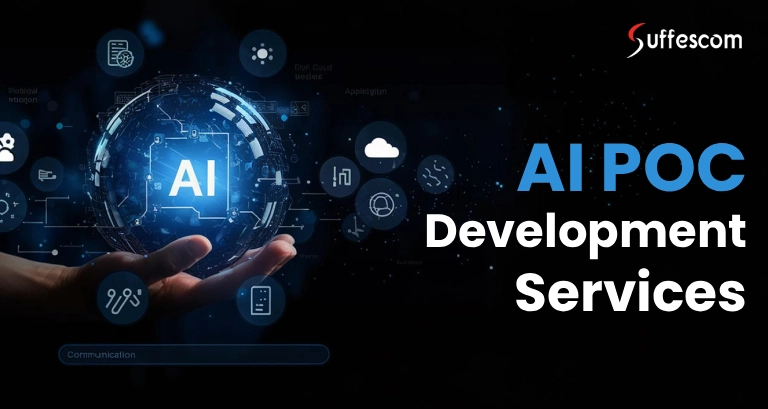Build AI Salon Training Software System: Features, Use Cases & Future Trends

Beauty and salon businesses today are facing immense challenges when it comes to training staff members. The traditional methods have become highly costly and time-consuming, and the salons are finding it extremely difficult to invest in training opportunities.
The one-on-one mentoring, too, across various locations, is not possible. It raises serious scalability issues. The fragmented mentorship, apprenticeship cutbacks,and in‑person training are some traditional methods which have become obsolete in today's times.
The ultimate saviour for salon operators is the AI salon training software system. The personalized learning paths, AR/VR Modules, and data-driven insights are the key elements that streamline the way salons deliver measurable skills to scale knowledge or expertise across multiple locations, meeting clients' expectations.
Rise of AI in the Beauty Industry
- By 2030, the global AI beauty tech market is expected to generate revenue of $74,642.6 million with a CAGR of 19.7% (2025 - 2030).
- According to McKinsey, Gen AI could add $9 billion to $10 billion to the global beauty industry.
- It is also anticipated that the global beauty market will grow by 5% annually by 2030.
Artificial intelligence has the power to upgrade salon training with automated administrative support and virtual training platforms. The advanced tools will not only help newcomers learn at their own pace but will also persuade entrepreneurs to invest in this lucrative industry.
What is an AI Salon Training Platform?
An AI-driven salon learning platform uses artificial intelligence to educate and train budding stylists. It offers access to a wide range of beauty salon professionals, including estheticians, hairstylists, and colorists, to gain a deeper insight into learning through interactivity. Prosthetic technologies, such as AR/VR and ML, aid in advanced skill improvement.
Develop virtual salon training app to provide personalized, interactive, and scalable training for beauty and personal service professionals. It serves a much larger purpose for the learners, which is illustrated below;
1. Skill Development
To train a complete novice, or up-skill a professional's technique when it comes to hair coloring, hair cutting, skin treatments, or nail design.
2. Standardized Training
To ensure that quality or service standards are met across franchises or salon chains.
3. Simulated Practice
To provide beauty stylists/students realistic practice environments through either augmented or virtual reality practice without actually having real clients.
4. Performance Feedback
To utilize AI when assessing technique, timing, or outcome, and providing objective feedback and suggestions for performance improvement.
5. Certification & Assessment
To track progress and provide records of attended and completed training modules.
Centralize Salon Training Operations: AI Salon Training Software
How Does the Virtual Salon Training App Work?
- The stylist/students create their profile on the platform.
- The system conducts an initial skills level assessment.
- AI generates a unique training program specific to the user skill level, goals, and previous performance.
- The modules include video tutorials, simulated interactions, client consultations, styling, or product application.
- The learners can complete their tests or perform practice, and track their performance.
Core Features of AI Salon Training Software System
1. Dynamic Training Path
The platform dynamically adjusts training modules depending on the stylist or therapist performance. With this feature, the learner if struggling in any of the area, then the platform offers deeper practice opportunities or simplified explanations.
2. Personalized Content Recommendations
The platform’s recommendations for videos, quizzes, simulated demos, or readings are driven by the learner’s performance and training history. It keeps learners engaged and on pace, the recommendations also keep progress meaningful and driven at an individual level.
3. Real‑Time Feedback & Smart Assessments
Interactive quizzes, simulated salon situations, and virtual assessments provide real-time feedback with the simulation. For example, if an individual takes an incorrect step in a hair or skincare simulation experience, it would indicate they had made an error and made supportive suggestions.
4. Virtual Tutors & Chatbots
AI-powered chatbots assist the learner in answering the user’s questions and assisting them in clarifying techniques whenever the learner has a question. These virtual assistants act like real-life mentors, allowing for conversations in learning experiences so learners would rely less on trainers for ordinary questions.
5. Immersive VR/AR Simulation
Learners can engage with digital clients to practice consultations, techniques, or product demos in a controlled environment. These immersive modules lead to realistic training experiences and measurable objective feedback on performance.
6. Analytics Dashboards
Predictive analytics dashboards for instructors and salon managers predicts learner progress, highlight skill gaps, and notify instructors of at‑risk learners.
7. Content Authoring
The system auto-generates training content such as quizzes, flashcards, and study guides, from a variety of existing sources, including videos and slides, thereby fast-tracking content alignment.
8. Gamification
Learning journeys include leaderboards, badges, reward points, and micro‑learning modules. This makes learners interested and engaged, helping them maintain a high-quality service experience and ensuring continuous skill improvement.
9. Multimodal learning support
To meet the various learning preferences and accessibility requirements of the staff, the AI E-learning software system provides content in a variety of formats, including video, audio, text, and simulations. It offers support features such as auto‑translate, speech-to-text capabilities, subtitles, and complexity configuration for greater inclusivity.
What are the Benefits of an AI-driven Salon Learning Platform?
a. For Businesses
1. Increased Operational Efficiency
AI reduces the number of administrative tasks salon owners have to carry out. Administrative duties, such as scheduling appointments, managing supplies, etc, are handled more holistically by the owner and their staff, and errors can be eliminated when specific processes are automated.
2. Data-Driven Choices
AI analytics can provide salon owners with information about clients' preferences and purchasing habits, including their preferences for standard services. This valuable user data enables them to create more successful marketing strategies, offer better service choices, provide better customer assurance, and foster loyalty.
3. Revenue Generation
AI-driven salon learning platform development helps businesses capture massive revenue. All this is possible through subscription models, where educational content is sold to learners at a certain price. They can even sell salon products online, generating amplified leads for their physical salons. Even by providing access to premium AI personalized tools and features, the platform owners charge a specified percentage, which helps them generate revenue.
b. For Individuals
1. Skill Development
AI-powered salon training platforms help individuals to learn at their own pace and level of proficiency, delivering personalized content and feedback. The result of this personalization will allow team members to acquire new skills in a way that is quick and easy for them, to maximize performance and satisfaction in their jobs.
2. Real-Time Performance Feedback
Custom AI salon training platform development assesses team performance and provides real-time monitoring, conducting demonstrations, and engaging with staff at designated rates. A significant advantage of real-time feedback is that individuals can identify where to improve and track their progress over time, all while learning. Receiving constructive feedback right away allows staff to improve their skills more quickly.
3. Learning Opportunities
The more learning individuals do, the more prepared team members will be in their career path for future opportunities. Being able to master advanced techniques and services will lead to promotions, responsibilities, and earning power. These also offer certification programs, confirming progression in skills, making them more marketable for more employment in the future.
How to Develop a Virtual Salon Training App?
1. Conceptualization
The first step towards Custom AI salon training platform development is to identify your aim and objectives, as well as who your target audience is. Clearly outlining the scope of your app will help decide on features, technology, and content. At this stage, you should also identify if your app will be solely an educational-based format or if it will include simulations and certifications.
2. Market Research
AI-driven salon learning platform development requires thorough market research to understand what your target users need and expect. Look into existing salon training platforms, identify gaps, and perform competitor analysis to gain valuable insights.
3. Select the Right Tech Stacks
The technology stack truly determines how well your app can function and scale. Flutter or React Native are used for cross-platform mobile, web and desktop apps. For high-value simulations, looking into Unity 3D or Unreal Engine will allow your simulation to be as realistic as possible with 3D hair, facial features, and proper tool interactions. Partnering with an expert in on demand beauty service app development can help you seamlessly integrate AI, AR/VR, and real-time features to create a powerful, user-friendly salon training platform.
Backend services may include Node.js or Firebase, both of which allow real-time transfer and exchange of data. ARKit, ARCore, and WebXR are used for AR/VR functionality. TensorFlow and PyTorch both being open-source DL frameworks are helpful for visualization and model deployment.
4. Necessary Integrations
The most pivotal thing is to integrate AI With Existing Salon Software through integrating pre-built AI services, building custom AI models, or using third-party APIs. Also, for advanced interactivity, Unity/Unreal engines are used for an immersive salon environment. Various spectacular elements are added, helping users to use tools to apply makeup, perform skincare & virtual haircut, etc.
5. Test and launch
Once the product is ready, test it for bugs and errors. Gather feedback and implement strategies to catch the major issues beforehand. When the app is free from abnormalities, launch the app in the dedicated production environment and reach your credible audience.
AI-driven Salon Learning Platform Development: Top Use Cases Personalizing Customer Experiences
1. Franchise Salons
Franchise salons typically operate across multiple cities. AI salon learning software offers a centralized interface that allows all stylists to access the same high-quality professional educational materials, simulations, and assessments. The software tracks each salon's team progress and provides performance analytics to franchise owners or regional managers. This allows them to quickly monitor each stylist's skill level and determine exactly what training is needed, without in-person training.
2. Independent Stylists
AI salon training software offers independent stylists a flexible, self-paced way to develop their skill set from the comfort of their own home or studio. AI modules for advanced coloring, new hair cutting techniques, or emerging skincare treatments can assess and recommend options based on past activity or a lack of skill. They can take advantage of virtual client simulations that prepare the stylist for various client requests and scenarios, without the need for live models or a classroom setting.
3. Freelance Beauticians
Custom AI salon training platform development includes interactive 3D tutorials for specific services like bridal makeup, hair styling, or skin treatments. The AI salon training software system will analyze user behavior and enable freelancers to refresh specific skills relevant to the work type or the client's request.
4. Corporate Beauty Brands
Many large beauty brands have sales representatives and brand ambassadors, who can effectively demonstrate and sell products; they need in-depth knowledge of all product characteristics and features. An AI salon training platform offers a digital venue where individuals can not only learn product feature lists but also learn how to practically apply the products.
Custom AI Salon Training Platform Development Services at Affordable Prices
What is the Future of AI in Salon Training?
AI-driven salon learning platform development will have undergone an unprecedented transformational journey, following a path of innovation and excitement that integrates and engages the entire salon industry. As salons respond to the demands of digital transformation, AI learning platforms will evolve from traditional training solutions into smart learning hubs.
The AI salon training software system utilizes AI/ML to assess the individual skill level of each stylist and create personalized learning pathways tailored to their current abilities. These AI training systems will even simulate real-life salon scenarios using augmented reality and virtual reality. Stylists will be able to develop skills and build customer engagement in a safe and immersive environment.
AI-driven Salon Learning Platform Development Company- What Sets Us Apart?
As a leading AI development company, we have delivered tailored solutions to businesses existing across the globe. With expertise in emerging technologies like AI and AR/VR, we have gained a competitive advantage in the industry. Leverage our AI salon booking software development services that will streamline operations from scheduling to managing and offering recommendations in just a few taps.
Our developed AI salon training software system is equipped with distinctive features, including an AI virtual try-on feature for salon businesses, data-driven insights, and inventory management.
Why wait? Contact us and get a fully loaded custom AI salon training platform for your business.
People Also Search For
1. How much does it cost to build an AI salon training software system?
The AI development cost ranges between $10000 - $30000, based on the feature integration, geolocation of the firm, etc.
2. How much time does it take to develop virtual salon training app?
AI-driven salon learning platform development time usually lies between 4-5 weeks, depending on the platform complexity.
3. How does AI salon training software system work?
The AI accesses individual skills and suggests personalized training paths. The real-time feedback and the interactive simulations help learners to enhance their techniques.
4. Is the AI-driven software compatible with the existing systems?
Yes, it can be integrated with the existing salon software, ensuring smooth business processes.
5. Is the software system appropriate for multi-location salon chains?
Definitely, the increased scalability helps the AI-driven salon learning platform to handle training across different locations.
6. Does the custom AI Salon Training Software support multiple languages?
Absolutely, the software supports diverse languages to accommodate large sections of people existing in different parts of the world.







